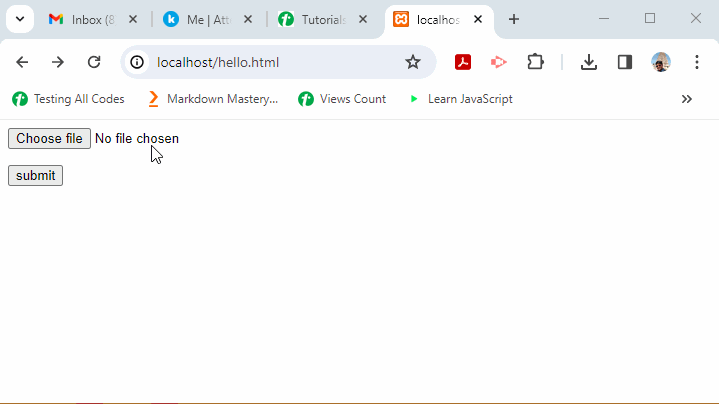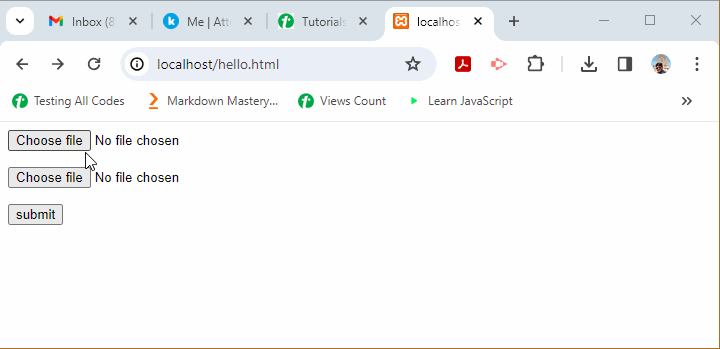
- PHP - Home
- PHP - Roadmap
- PHP - Introduction
- PHP - Installation
- PHP - History
- PHP - Features
- PHP - Syntax
- PHP - Hello World
- PHP - Comments
- PHP - Variables
- PHP - Echo/Print
- PHP - var_dump
- PHP - $ and $$ Variables
- PHP - Constants
- PHP - Magic Constants
- PHP - Data Types
- PHP - Type Casting
- PHP - Type Juggling
- PHP - Strings
- PHP - Boolean
- PHP - Integers
- PHP - Files & I/O
- PHP - Maths Functions
- PHP - Heredoc & Nowdoc
- PHP - Compound Types
- PHP - File Include
- PHP - Date & Time
- PHP - Scalar Type Declarations
- PHP - Return Type Declarations
- PHP - Operators
- PHP - Arithmetic Operators
- PHP - Comparison Operators
- PHP - Logical Operators
- PHP - Assignment Operators
- PHP - String Operators
- PHP - Array Operators
- PHP - Conditional Operators
- PHP - Spread Operator
- PHP - Null Coalescing Operator
- PHP - Spaceship Operator
- PHP Control Statements
- PHP - Decision Making
- PHP - If…Else Statement
- PHP - Switch Statement
- PHP - Loop Types
- PHP - For Loop
- PHP - Foreach Loop
- PHP - While Loop
- PHP - Do…While Loop
- PHP - Break Statement
- PHP - Continue Statement
- PHP Arrays
- PHP - Arrays
- PHP - Indexed Array
- PHP - Associative Array
- PHP - Multidimensional Array
- PHP - Array Functions
- PHP - Constant Arrays
- PHP Functions
- PHP - Functions
- PHP - Function Parameters
- PHP - Call by value
- PHP - Call by Reference
- PHP - Default Arguments
- PHP - Named Arguments
- PHP - Variable Arguments
- PHP - Returning Values
- PHP - Passing Functions
- PHP - Recursive Functions
- PHP - Type Hints
- PHP - Variable Scope
- PHP - Strict Typing
- PHP - Anonymous Functions
- PHP - Arrow Functions
- PHP - Variable Functions
- PHP - Local Variables
- PHP - Global Variables
- PHP Superglobals
- PHP - Superglobals
- PHP - $GLOBALS
- PHP - $_SERVER
- PHP - $_REQUEST
- PHP - $_POST
- PHP - $_GET
- PHP - $_FILES
- PHP - $_ENV
- PHP - $_COOKIE
- PHP - $_SESSION
- PHP File Handling
- PHP - File Handling
- PHP - Open File
- PHP - Read File
- PHP - Write File
- PHP - File Existence
- PHP - Download File
- PHP - Copy File
- PHP - Append File
- PHP - Delete File
- PHP - Handle CSV File
- PHP - File Permissions
- PHP - Create Directory
- PHP - Listing Files
- Object Oriented PHP
- PHP - Object Oriented Programming
- PHP - Classes and Objects
- PHP - Constructor and Destructor
- PHP - Access Modifiers
- PHP - Inheritance
- PHP - Class Constants
- PHP - Abstract Classes
- PHP - Interfaces
- PHP - Traits
- PHP - Static Methods
- PHP - Static Properties
- PHP - Namespaces
- PHP - Object Iteration
- PHP - Encapsulation
- PHP - Final Keyword
- PHP - Overloading
- PHP - Cloning Objects
- PHP - Anonymous Classes
- PHP Web Development
- PHP - Web Concepts
- PHP - Form Handling
- PHP - Form Validation
- PHP - Form Email/URL
- PHP - Complete Form
- PHP - File Inclusion
- PHP - GET & POST
- PHP - File Uploading
- PHP - Cookies
- PHP - Sessions
- PHP - Session Options
- PHP - Sending Emails
- PHP - Sanitize Input
- PHP - Post-Redirect-Get (PRG)
- PHP - Flash Messages
- PHP AJAX
- PHP - AJAX Introduction
- PHP - AJAX Search
- PHP - AJAX XML Parser
- PHP - AJAX Auto Complete Search
- PHP - AJAX RSS Feed Example
- PHP XML
- PHP - XML Introduction
- PHP - Simple XML Parser
- PHP - SAX Parser Example
- PHP - DOM Parser Example
- PHP Login Example
- PHP - Login Example
- PHP - Facebook Login
- PHP - Paypal Integration
- PHP - MySQL Login
- PHP Advanced
- PHP - MySQL
- PHP.INI File Configuration
- PHP - Array Destructuring
- PHP - Coding Standard
- PHP - Regular Expression
- PHP - Error Handling
- PHP - Try…Catch
- PHP - Bugs Debugging
- PHP - For C Developers
- PHP - For PERL Developers
- PHP - Frameworks
- PHP - Core PHP vs Frame Works
- PHP - Design Patterns
- PHP - Filters
- PHP - JSON
- PHP - Exceptions
- PHP - Special Types
- PHP - Hashing
- PHP - Encryption
- PHP - is_null() Function
- PHP - System Calls
- PHP - HTTP Authentication
- PHP - Swapping Variables
- PHP - Closure::call()
- PHP - Filtered unserialize()
- PHP - IntlChar
- PHP - CSPRNG
- PHP - Expectations
- PHP - Use Statement
- PHP - Integer Division
- PHP - Deprecated Features
- PHP - Removed Extensions & SAPIs
- PHP - PEAR
- PHP - CSRF
- PHP - FastCGI Process
- PHP - PDO Extension
- PHP - Built-In Functions
PHP - $_FILES
$_FILES is one of the 'superglobal', or automatic global, variables in PHP. It is available in all scopes throughout a script. The variable $_FILES is an associative array containing items uploaded via HTTP POST method.
A file is uploaded when a HTML form contains an input element with a file type, its enctype attribute set to multipart/form-data, and the method attribute set to HTTP POST method.
$HTTP_POST_FILES also contains the same information, but it is not a superglobal, and it has now been deprecated.
HTML File Input Element for File Upload
The following HTML script contains a form with input element of file type −
<input type="file" name="file">
This "input type" renders a button captioned as file. When clicked, a file dialogbox pops up. You can choose a file to be uploaded.
The PHP script on the server can access the file data in $_FILES variable.
Properties of $_FILES
The $_FILES array contains the following properties −
$_FILES['file']['name'] − The original name of the file that the user has chosen to be uploaded.
$_FILES['file']['type'] − The mime type of the file. An example would be "image/gif". This mime type is however not checked on the PHP side.
$_FILES['file']['size'] − The size, in bytes, of the uploaded file.
$_FILES['file']['tmp_name'] − The temporary filename of the file in which the uploaded file was stored on the server.
$_FILES['file']['full_path'] − The full path as submitted by the browser. Available as of PHP 8.1.0.
$_FILES['file']['error'] − The error code associated with this file upload.
PHP File Upload Error Codes
The error codes are enumerated as below −
| Error Codes | Description |
|---|---|
UPLOAD_ERR_OK (Value=0) |
There is no error, the file uploaded with success. |
UPLOAD_ERR_INI_SIZE (Value=1) |
The uploaded file exceeds the upload_max_filesize directive in php.ini. |
UPLOAD_ERR_FORM_SIZE (Value=2) |
The uploaded file exceeds the MAX_FILE_SIZE. |
UPLOAD_ERR_PARTIAL (Value=3) |
The uploaded file was only partially uploaded. |
UPLOAD_ERR_NO_FILE (Value=4) |
No file was uploaded. |
UPLOAD_ERR_NO_TMP_DIR (Value=6) |
Missing a temporary folder. |
UPLOAD_ERR_CANT_WRITE (Value=7) |
Failed to write file to disk. |
UPLOAD_ERR_EXTENSION (Value=8) |
A PHP extension stopped the file upload. |
Single File Upload Form
The following "test.html" contains a HTML form whose enctype is set to multiform/form-data. It also has an input file element which presents a button on the form for the user to select file to be uploaded. Save this file in the document root folder of your Apache server.
<html>
<body>
<form action="hello.php" method="POST" enctype="multipart/form-data">
<p><input type="file" name="file"></p>
<p><input type ="submit" value="submit"></p>
</form>
</body>
</html>
The above HTML renders a button named "Choose File" in the browser window. To open a file dialog box, click the "Choose File" button. As the name of selected file appears, click the submit button.

Server-Side Script to Handle Single File Upload
The server-side PHP script (upload.php) in the document root folder reads the variables $_FILES array as follows −
<?php echo "Filename: " . $_FILES['file']['name']."<br>"; echo "Type : " . $_FILES['file']['type'] ."<br>"; echo "Size : " . $_FILES['file']['size'] ."<br>"; echo "Temp name: " . $_FILES['file']['tmp_name'] ."<br>"; echo "Error : " . $_FILES['file']['error'] . "<br>"; ?>
It will produce the following output −
Filename: abc.txt Type : text/plain Size : 556762 Temp name: C:\xampp\tmp\phpD833.tmp Error : 0
Multiple File Upload Form
In PHP, you can upload multiple files using the HTML array feature −
<html>
<body>
<form action="hello.php" method="POST" enctype="multipart/form-data">
<input type="file" name="files[]"/>
<input type="file" name="files[]"/>
<input type ="submit" value="submit"/>
</form>
</body>
</html>
Now, change the PHP script (hello.php) to −
<?php
foreach ($_FILES["files"]["name"] as $key => $val) {
echo "File uploaded: $val <br>";
}
?>
The browser will show multiple "Choose File" buttons. After you upload the selected files by clicking the "Submit" button, the browser will show the names of files in response to the URL http://localhost/hello.html as shown below −
